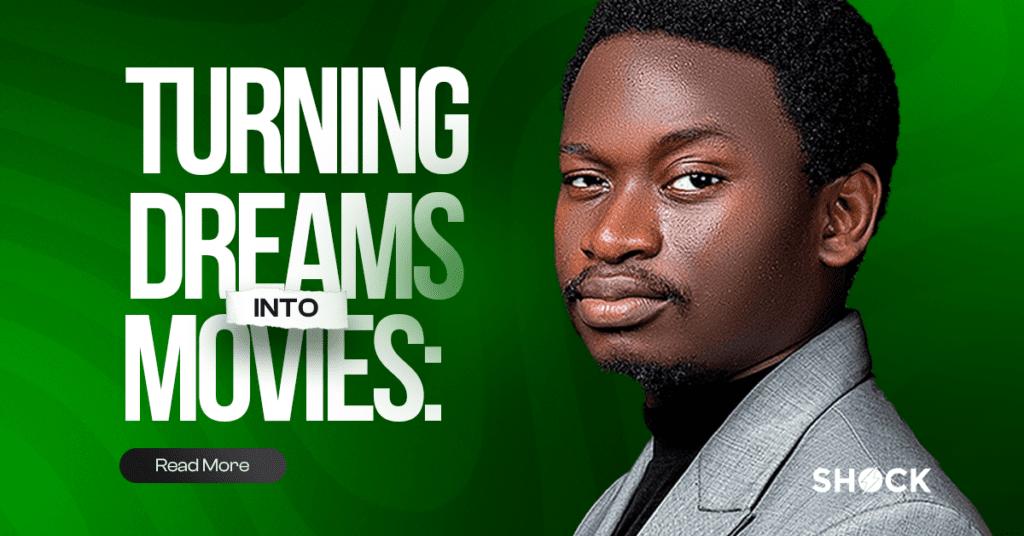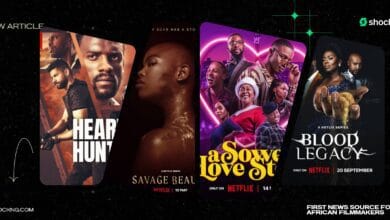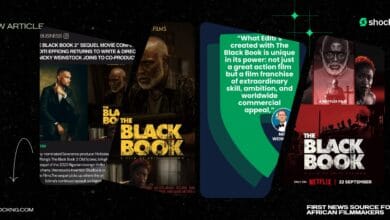The Story⚡
Nigerian Crime thriller SHINA is making the rounds on Netflix. The movie, released to the streaming platform in June 2024, follows the story of a Taxi Driver in Lagos City who decides to deliver a mysterious package in exchange for his dying grandmother’s medical treatment.
We sat down for a chat with the Writer and co-director of the movie Muyiwa Adesokun to uncover his Directorial Debut, Industry thoughts, Future plans and much more.
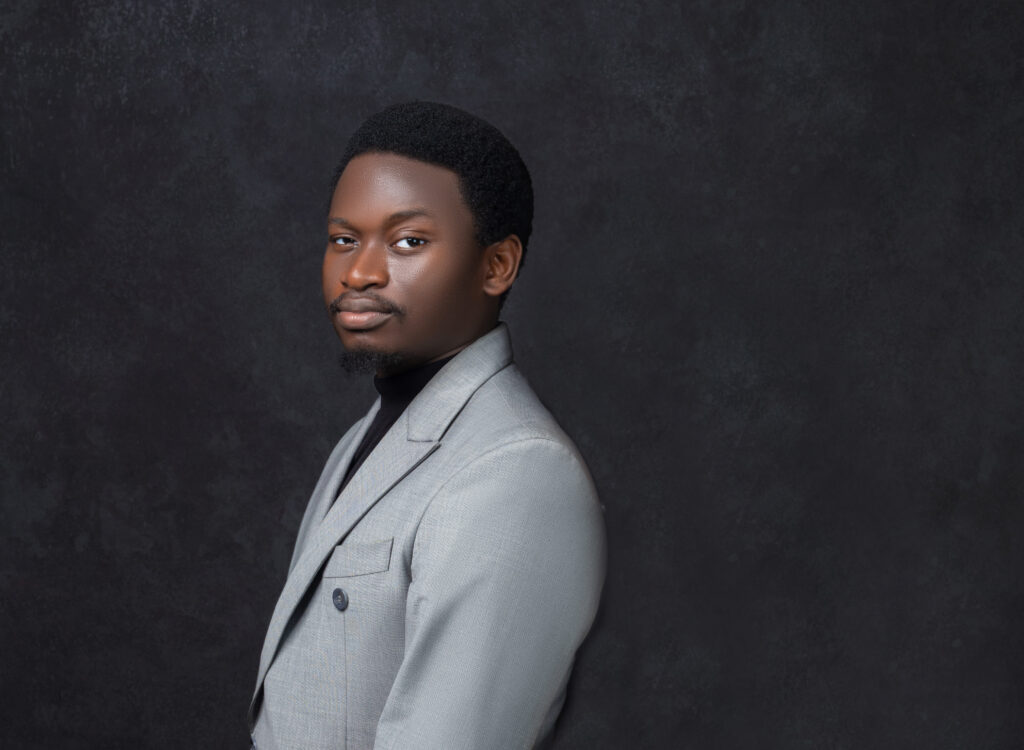
A Bit Of Background Information About Director Muyiwa Adesokun
I grew up in Lagos, and I credit my journey into the world of storytelling to one of my sisters. One summer, she came home with two or three cases full of books and a trophy from a university competition where she had won for her poetry. Seeing her success made me think, “If she can do it, why can’t I?”
I read most of the books she brought home, and through them, I was introduced to the works of John Grisham and Ted Dekker. One day, I wrote something and posted it on Instagram. Someone commented that it was a nice poem and then asked, “Do you have a book?” Until that moment, I hadn’t considered my writing as poetry, but that question sparked the idea of writing my first book.
Fortunately, I knew an established author and poet, Tolu Akinyemi, who guided me on my journey to publishing my book; The Taxi Driver and Other Poems. That marked my introduction to the world of storytelling.
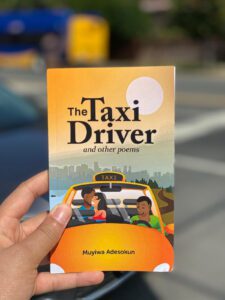
The opportunity to tell stories through film was both exciting and daunting, as it was something I had never done before. This entire experience has deepened my appreciation for storytellers in all forms—whether through film, poetry, photography, or other mediums. After making SHINA, I now have an even greater respect for filmmakers, because making films is incredibly challenging.
Where did You get a degree, have you attended film school?
I studied Computer Science. I also have a background in design and advertising, having worked at an advertising agency. What I know about film comes from a strong desire to be on film sets, watching tons of films and reading loads of scripts. I believe it’s an advantage for a director to be able to also write their own stories. I might be wrong, but I’ve observed that those who both direct and write have a unique way of telling their stories.
To answer the question, no I didn’t attend film school…at least not yet.
The Pre-Production Process Of The Film ‘SHINA’
Shina was literally a dream—a story that came to me while I was asleep. I remember waking up and immediately writing everything down so I wouldn’t forget. I began studying scriptwriting and everything it entails. I watched several movies, and read books and scripts to gain a basic understanding of scriptwriting structure.
I’ve always enjoyed writing. Before Shina, The Taxi Driver and Other Poems marked my debut into writing. Published in the United Kingdom, the collection was my first proof that writing was something I really wanted to do.
When I first started writing Shina, I thought it would be a short film, but as I continued writing, it evolved into something more. I eventually shared the script with a production company called Film Trybe, with the hopes they would like the script and pay for it. To my surprise, they came back to me and said that the script was written from a director’s point of view, and they wanted me to direct it.
What followed was a journey of writing and rewriting the script, developing a short list, casting, and recce, till it was go time!
That’s essentially how Shina came to be.
The Motive Behind The Choice Of Cast (Most Especially Timini Playing Shina)
To be honest, it was a joint effort. Everyone suggested names of who they thought would be perfect for the role, and Timini’s name came up several times. I’ve watched Timini and know he has range in his work. There’s a common perception that he only plays bad boy roles, but his recent projects debunk that view, and we saw a different side of him in Shina. I don’t think anyone has seen Timini like this before, which was one of the reasons he was perfect for the role.
A Character That Was A Delight To You
I thoroughly enjoyed working with Shawn Faqua, who played AY.
His interpretation of the character was quite different from what was written, and I was very pleased with the outcome on screen. He truly made the role his own, and witnessing the transformation of something I’d written into something even better through his performance was a wow moment for me.

Linda, who played Dr. Asinobi, was phenomenal in her role. Her first scene on set was probably the most challenging for her, but she delivered it flawlessly. Watching her and Shawn in particular was fascinating, and the same goes for Tope. It was an unusual role for him, but he did a stellar job.
And of course, working with veterans like Segun Arinze, Akin Lewis, and Iya Rainbow was an absolute joy. These are people we grew up watching. Being in the same room with them was such a privilege. There’s a reason they are legends in the industry. Altogether, I think we had a great blend, and everyone worked well together.



The Role Of Iya Rainbow (Idowu Phillips) Being Timini’s Grandmother In Shina
Shina’s grandmother is the anchor of the story; she’s the reason everything is happening. Iya Rainbow being an experienced actor, knew how to convey this to the audience. It was an easy decision to cast her. To be honest, I couldn’t see anyone else playing that role.
Shina gets into a fight with the policemen when he was on the way back to the hospital and they throw him in jail, then Shawn Faqua comes to get him from the jail. What was the creative process of putting those two scenes together?
I believe the creative process really comes through in the writing. The scene where he’s stopped by the police isn’t something new to us; undue and unnecessary harassment. Shawn Faqua’s character getting him out of jail highlighted BB’s power and influence, showing that his connections run deep enough to get someone out of prison. That was the main idea behind those two scenes.
The Sacrifice of SHINA’s Mother
The message we wanted to convey was that leaving the cult came at a cost, and in this case, it was his mother. Some earlier versions of the script explored his past in more detail, including what happened to him as a young man. However, we were careful not to stray too far from the core story. For me, the key point was to show that he carried the loss of his mother.
Fun Moments On Set
There were plenty of fun moments on set, especially during the fight scenes. While choreographing one of them, I even took an accidental punch to the jaw—glad we can laugh about it now! Haha! The spirited football debates were just as entertaining.
Unfortunately, I didn’t have any “arsenal” to defend my beloved Manchester United
Inside The Third Act of Shina
This part of the story concerns redemption, guilt, and doing the right thing. His thought process was focused on getting his life back on track and becoming a better person, which is why he was so angry at Ugo for everything that happened. There was also a deep sense of guilt because the person who was killed was the fiancé of the woman who was trying to help him and his grandma. He felt that the least he could do was to make things right.
Seeking assurance from the officer that his grandma would be fine was comforting, but at that moment, it was really about attempting to do the right thing. This also underscores one of the takeaways of the film.
Working Together With The Co-Director To Make This Film
We became friends on set, as we didn’t know each other beforehand. We got to know each other well, and even after the film was completed, we maintained a good relationship. It wouldn’t have worked any other way if we hadn’t made the effort to build that friendship.
On set, we had a scene breakdown of the entire film, outlining everything in advance. We knew who would direct each scene, but even when one person was directing, the other was still offering ideas and input. It was truly a collaborative effort, regardless of who was in charge of shooting a particular scene that day.
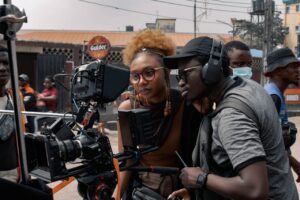
Shina is doing well on Netflix, How did this come about?
It’s all God, honestly. The outcome has been completely unexpected—it was on Netflix’s top 10 for 7 weeks and it’s currently the second most watched film in Nigeria on Netflix in 2024 which is just mind-blowing. To think a few days before it was sitting at number ten on that list. While we were making the film, I don’t think anyone imagined it would achieve this level of success. I don’t believe it’s solely due to human effort. So, I just give all the glory to God.
Was a theatrical run considered?
Yeah, it was probably more of an indie-type production.
We discussed various options, including cinemas, streaming, festivals, and other avenues. I leaned towards streaming because I felt it was a good fit for that platform, and taking it to cinemas involved a lot of behind-the-scenes work. At the time, streaming just made the most sense.
Peculiar Challenges Faced As A First Time Director
I think it was one of the hardest things I’ve ever done. During the writing process, it’s nice to imagine how the scenes would look, but actually bringing them to life on set presented numerous challenges. For example, there were many car scenes in the film, and we could spend an entire day shooting them. Director of Photography; Emmanuel Igbekele came up to me and joked that he hoped I’d consider reducing the number of car scenes in my next film. Shooting those scenes was quite hectic. Despite the difficulties, the driving force for me was seeing something I had written come to life. That sense of accomplishment and the adrenaline it provided helped me push through the challenges and get to the finish line.
Things About Yourself That Filmmaking Has Revealed To You.
I’ve realized that I truly enjoy storytelling. On the last day of the shoot, I was with one of the producers, expressing how much I’d love to do it again. Some filmmakers will tell you that while you’re in the thick of it, you just want to wrap things up and once it’s over and the storm has passed, you find yourself eager to dive back in. Storytelling is something I’m passionate about. I’m currently working on new projects. I am writing at the moment, so we will see.
Adaptation of Nigerian Books into Movies.
It’s something I definitely want to pursue. Adapting a book into a film is a different ball game altogether and isn’t easy. It involves condensing hundreds or thousands of pages into a few hours, which requires a high level of skill.
I believe we are equipped to tackle this challenge. The process will be slightly different and more intense, requiring significant collaboration with the book’s author. The author has a vision for their work, and there can be conflicts in how a director interprets it. This is common even in Hollywood—sometimes you read a book and watch the film adaptation and wonder about the discrepancies. It takes a lot of effort to make it work, but I’m confident it’s something we can achieve.
Filmmakers You Enjoy Their Work
I try to watch everything! I’m particularly interested in the works of Jordan Peele, Quentin Tarantino, Grant Singer, James Cameron, and Aaron Sorkin, among others. These directors and writers are some of the ones I look up to.
What Was The Last Film You Watched That You Really Got Something Out Of?
Perfect Days directed by Wim Wenders and written by Wenders and Takuma Takasaki.
Typically, when a film introduces the ordinary life of a character, this aspect is concluded by the end of the first act. However, in this film, it extends into the second act and even touches the third. It’s a brilliant example of knowing the rules well enough to break them. I’ve never been so captivated by a ‘boring’ character before. What a film!
What is the main challenge that writers face when it comes to completing their work?
Learning to let go. Every writer usually feels some dissatisfaction with the final interpretation.
Timini and I joked about this on set. After finishing a scene, he’d want to know if it was good, and he would say, “There’s no point asking you because you wrote it; I’m sure you’ll say it wasn’t good.”
From a writer’s perspective, it often feels like the work is never truly finished and could always be better. The thing about art is that, at some point, you have to let go. If an artist had six more months to work on a completed painting, they might spend that time making corrections and trying to improve it. But eventually, you need to release your work to the world. Even though I get excited during the writing process, I always keep in mind that it might not be 100% of what I originally envisioned.
Word Of Advice For Other Aspiring Film-Makers With Ideas, and Dreams
Immerse yourself in the work of those who have done it before. The best advice I received about filmmaking was to watch the first film of your favourite director and then watch all their subsequent films up to the most recent one. This approach will give you a wealth of insight. Reading scripts has also been immensely helpful for me. I read scripts like I read books. I would watch a film, then go back and read the script, or sometimes read the script while watching the film. This practice opened my mind. Soak yourself in others’ work and engage deeply with it.
If You Were To Make SHINA Again, What Would You Do Differently?
I wouldn’t change a thing. You can never make your first film twice, and the experiences and lessons from your first film will stay with you forever. Those first-time challenges are the best teachers.
In Summary
Director Muyiwa Adesokun presently has irons in the fire and we can fully expect more productions from him. Shina is streaming on Netflix; A Literal testament to the fact that with a bit of work, dreams can indeed become something tangible.
